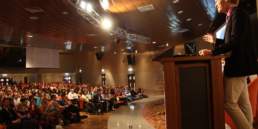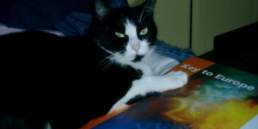Discussing politics with AEGEE alumni Frank Burgdörfer is fun. Because it’s always an exchange of ideas on a very high level. Many AEGEE members had the pleasure to experience these talks, since Frank Burgdörfer was the face of the International Politics Working Group from 1997 till 1999 – and turned it into the most active working group of its time. Even when he left the association, he continued his ideas and projects – on a new level. Together with other alumni, Frank founded the association: “Citizens of Europe” – or “AEGEE for adults”, as he told the Golden Times. He also founded x³ Burgdörfer & Ness, his own think tank – and a few weeks ago he became board member of the German chapter of the European Movement.
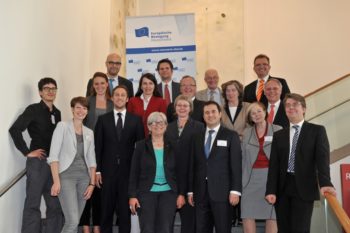
GT: Congratulations to your election as board member of the Netzwerk Europäische Bewegung Deutschland (EBD), the European Movement in Germany! For all, who don’t know the European Movement: what is it about? How many members does it have?
Frank Burgdörfer: The European Movement, founded in 1948, aims to mobilize citizens and to advocate a democratic Europe based on individual rights, the rule of law and equality. On the European level, it consists of 33 international associations – among them AEGEE – and 38 national councils. Representing 238 German member organisations, the EBD is the largest of the national movements. Here AEGEE is formally represented by the Aachen antenna. The secretary general coordinates our activities assisted by 12 co-workers and 2 interns.
GT: So what is the EBD doing?
Frank: Our aim is to continuously demonstrate in all relevant public debates that the European idea is not an ideology supported by a monolithic group, but a very basic conviction shared by various people and groups with very different background and interest. Our aim is to make solutions to European challenges possible by mobilising broad support. We provide a strong network and various forums in order to enable dialogue among our member organisations and between them and decision-makers in governmental institutions and parliaments.
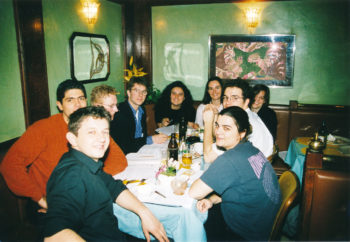
GT: What’s your task in the board?
Frank: Between the general assemblies, the board guides the activities of the network. In a body of 24, almost everybody is elected as a representative of a specific group of member organisations, such as think tanks, foundations, huge NGOs like the European federalists, political parties, labour unions or business associations. I am one of four board members without such a specific affiliation. I plan to voice the interest of small members such as Citizens of Europe, the organisation which suggested me, and of all those organisations which are based on voluntary involvement. I will contribute my knowledge, my experience and my international contacts. I am trying to approach my new responsibility with humbleness, curiosity and dedication, in order not to disappoint my supporters and to contribute to the success of the EBD.
GT: Does the European Movement organise own events like AEGEE?
Frank: We promote the activities and events of the member organisations. Events realised on a network level are open to members of the member organisations. After important meetings in Brussels we invite representatives of German ministries for “DE-briefings“ to present the outcome and tell us about the course of debates. In “EBD exklusiv“ events a limited number of people can have intensive and personal debates with interesting people, recently for example with the Norwegian minister for EU affairs. We keep contact with European Movements in other countries. Finally, we also have projects such as newsletters on specific topics, the prize “European Woman of the Year“ or the school competition “Europäischer Wettbewerb“.
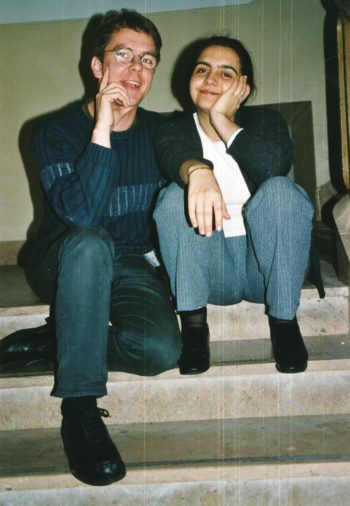
GT: What are the main differences and similarities of the European Movement compared to AEGEE?
Frank: In my perception, AEGEE is a European movement in the best sense of the term: based on clear European principles, but leaving it to its members to realise them in a variety of activities and projects. In contrast to the European Movement as a whole, AEGEE consists exclusively of students. Thus AEGEE is in effect focused stronger on the development of the individual skills and personalities of its active members. And they are not holding responsible functions in society yet.
GT: You founded the organisation “Citizens of Europe”. The name sounds a bit like AEGEE…
Frank: You are not wrong. The founders include Bernhard Klein, who used to be secretary of the IPWG and President of AEGEE-München, former AEGEE-Europe President Gerhard Kress and his later wife Minna Nikolova, the founder of AEGEE-Blagoevgrad. Among us we jokingly said we would establish “AEGEE for adults“. The idea was to provide a platform for activities involving people from all over Europe – but adjusted to the needs of people having job and family. Thus we chose the simplest construction possible: a local association registered in Munich, where most of us lived at that time, which would be open for members from all over Europe and led by a small board, while relying on big or small project teams wherever possible.
GT: How did it work out?
Frank: It has been a continuous up and down. After student time, it is even harder for people to dedicate themselves for longer periods. Over time, with a lot of trial and error, we managed to develop a certain portfolio of projects: conferences, trainings, an annual short-film-festival and other arts projects. We have reliable partner institutions all over Europe, which cooperate with us or host our events. In our Berlin office, there are regularly three volunteers from different European countries, one of them taking care of the online journal “Europe & Me“. A very recent one was Olimpia Parje by the way, who is quite well-known in AEGEE. Meanwhile we also sent about 35 people to partner organisations for usually 12 months within the EU’s European Voluntary Service programme.
GT: Why did you decide do leave the board of Citizens of Europe after ten years?
Frank: Assuring enough continuous activity in order to pay the office rent and being in charge whenever something goes wrong and whenever there is conflict kept me busy for years. At a certain point I realised that all this activity did not bring me or the association any further. I had the strong feeling that new people in charge were needed in order to make further development possible. The 10th anniversary was a good opportunity to hand on responsibility. Joining the EBD Board as a representative of Citizens of Europe two years after means a chance to still support the Citizens and is a great challenge for myself.
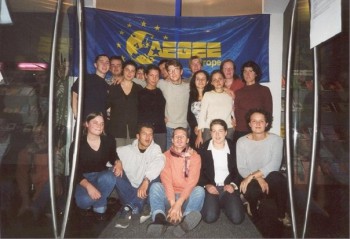
GT: Current board member of Citizens of Europe is Holger Schmitt. What did you think when you heard he was elected to the CD?
Frank: I congratulated him. I know Holger quite well since AEGEE-Berlin sometimes uses Citizens of Europe’s meeting room and roof terrace. And they are much better than us in organising parties when we have international guests.
GT: Let’s talk about your AEGEE background. When, how and why did you join AEGEE?
Frank: After returning from Erasmus in Göteborg in summer 1996, I was looking for a European surrounding, for a chance to meet people, to learn, to develop. I participated in two events of the „Europe & Euro“ project of AEGEE-Europe and got convinced to come to the Presidents’ Meeting – the predecessor of the EBM – in Veszprem. There I publicly disagreed with AEGEE-Europe’s President Sergio Caredda’s approach how to establish an International Politics Working Group (IPWG). He was busy as AEGEE president anyway. And obviously many people present decided to put this unknown impertinent guy to a test.
GT: How do you remember your time as president of the IPWG? What were the highlights?
Frank: I had a chance to experience which wonderful things are possible within AEGEE’s network. In the midst of many political turbulences we realised a Summer University in cooperation with AEGEE-Beograd, during which the difficult situation and perspectives of the Balkans were discussed. The year after, in 1999, we launched a series of events entitled “Ten Years of Transition” in different central European countries and contributed to what was called the “Peace Academy Project”, which took place mainly in the South of Europe. My basic idea was to demonstrate how a strong working group consisting of dedicated and experienced experts on a topic can be an ideal partner of locals if it comes to realising events of high quality.
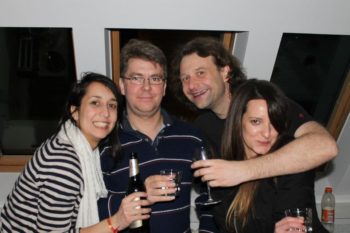
GT: What are your best and worst memories of your time in AEGEE?
Frank: In a huge organisation, there is certainly also something like “internal politics”. Some hurting and disappointing personal experience in that regard is not forgotten, but the wonderful memories are dominant. There was a conference about Kosovo conflict, which we realised in Budapest at the Central European University in 2000, exactly one year after the NATO attacks. We gathered students from all countries involved in the war, even from the US and Canada. It was tensed, it was passionate, and we all learned a lot – and even published a scientific book afterwards.
GT: Impressive! Do you have other examples?
Frank: Then there was the scholarship programme “Education for Democracy”. For 15 students from Serbia and Kosovo, who we brought to German and Dutch Universities for a year, I organised 10 seminars at various locations. I got to know wonderful people, some of them are good personal friends since. And finally I would like to mention my last project: a huge simulation of decision making in the European Union, which took place in the European Parliament. Obviously it affected my professional life: today my company makes more than half of its turnover with simulations of political processes.
GT: You have so much experience with different European organisations, you know AEGEE from inside and outside. What do you see as strengths and weaknesses of AEGEE?
Frank: Today I agree with my friend Gerhard Kress: AEGEE is doomed to run in circles. He said this when I just became active and did not want to hear it: in AEGEE, every generation needs to learn the same lessons again, is challenged by the same problems. But – and this is important – always different people learn and move forward. In effect, AEGEE has significantly changed the lives of thousands of people. It made them more open, it gave them a personal idea of what “Europe“ can be, it widened their horizon, gave them friends they otherwise never had met and it finally helped them develop self-confidence. I am one of the many people who would live very different lives without AEGEE.
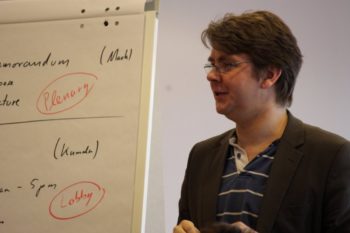
GT: Is AEGEE tackling the right European issues with the right strategy?
Frank: I am too far away from AEGEE to answer this question. Throughout the last 15 years, student life has changed, our society has changed and Europe has changed. Important is in my point of view, that AEGEE enables people to do what they deem important, that it encourages them to address what they believe to be relevant and that it strictly sticks to some basic principles such as “actions speak louder than words” and the idea of a continental network of friends. Within this context, whatever happens is right.
GT: You were one of the few AEGEE members who became entrepreneurs. You have degrees in economics and political science and could have easily found any kind of company job. Why did you instead found your own company?
Frank: I like to be creative and independent. I consider it a privilege to cover my living cost by selling essentially my own ideas. And all my voluntary activities, like also now in the EBD Board, would be difficult to realise if I had to stick to a regular working schedule and could not decide on my time rather freely.
GT: Can you tell us more about your company x³ Burgdörfer & Ness? What do you do there?
Frank: We develop ideas, how to explain political processes and complicated political issues in a comprehensible way. We provide this as a service to public institutions, mainly to their visitor’s departments. And we offer trainings for companies who have an interest in understanding politics, for example the dynamics of international conferences or the exact procedures of law-making.
GT: What do you personally do at x³ Burgdörfer & Ness?
Frank: My task – supported by a team of course – usually is to analyse complex realities, to reduce them to their core. And then to translate them in pictures, metaphors, models, which people can easily comprehend. Often by being active themselves, by taking over certain roles and responsibilities within a simulated situation.
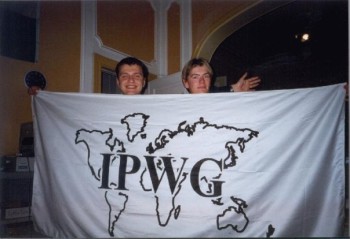
GT: You are an expert on European politics. A lot of countries in Europe have populist or nationalistic governments. What is the right strategy for the EU to deal with them? And what can AEGEE do?
Frank: We should not panic and give them an even bigger stage. The European project has made our nations stronger and wealthier, it has made all of us freer and gives as chances in life we would not have otherwise. Europe puts us in a position to solve our problems effectively. Together we can improve our economic and social model, together we can take influence on global developments, together we can help overcome problems in our neighbourhood. As individual nations, we would be irrelevant. We have all arguments on our side. We need to demonstrate that we mean what we say – and that there are democratic Europeans from very different political families who share the vision of a United Europe and stand for it. Nationalists pretend that they stand for freedom while Europe means to limit own options. The opposite is true: As Europeans we have options and choices we would not have otherwise. Together we can define what we want to happen – whereas nationalists can react only. In procedural questions we should not be dogmatic, regarding our values and principles we must. AEGEE does a lot if it comes to demonstrating what being European means. It might not reach a lot of public attention – but it gives people the very concrete experience that Europe is possible. AEGEEns belong to the very few who actually mean “Europe” when they say “we”. And that is the essential point.
GT: Which strategy should the EU have towards Russia and Ukraine?
Frank: In my point of view, essential European values are at stake: That all Europeans and all their nations are equal, that violence against others is not acceptable, that international treaties are to be fulfilled. Therefor this is a conflict about the very fundamentals of the European project. Taking a very clear and bold position does not serve Ukrainian interest only, but European interest in general. We are defending what made us strong. The challenge is to find means to deal with propaganda, with fiction – not only in Russia but also here in EU. We are observing here two completely different approaches to politics, international relations and media. Every step we make on the European side is controversially debated, continuously questioned and regularly attacked. Moscow hopes that this will be our weakness only, we must show that this is our way to define consensus and to prevail in the long run. The official Russia is currently enjoying itself as a pariah in the international scene. Containing it will hardly be possible – in the end the conflict is about either changing Russia or allowing it to damage Europe. However, I am confident: economically and with regard to the political concept we stand for, we are stronger. Nobody ever managed to fool a lot of people for a long time, as Abraham Lincoln said. If we stand united, this conflict will in effect even strengthen the basis of the European project.
About Frank Burgdörfer
Born in 1972 in the South-West of Germany, Frank Burgdörfer has been active in society since his youth days. As teenager he played in several bands, was freelance journalist for a local newspaper, board member of a culture and sports association and also worked on the farm of his parents. After this, Frank studyied economics in Gießen and political science in Munich – his thesis was dealing with the EU and the desintegration of Yugoslavia.
Frank was AEGEE member for only four years, but left a strong mark on the association. From 1997, the year he joined, till 1999 he was President of AEGEE’s International Politics Working Group, in the following two years he coordinated AEGEE projects on the Balkan. In 2002 he founded the asociation Citizens of Europe, whose chairman he was for ten years. In 2007 he became founding partner of the consulting company x³ Burgdörfer & Ness. In the same year Frank joined the “Team Europe”, the pool of speakers and lecturers of the European Commission. Since 30th of June 2014 Frank is board member of the German European Movement brnanch Europäische Bewegung Deutschland (EBD).
Related Posts
1st August 2019
The Gallery of All Presidents of AEGEE-Europe
Here is the gallery of all Presidents of AEGEE-Europe - with photos of every one of them. Enjoy the list!

